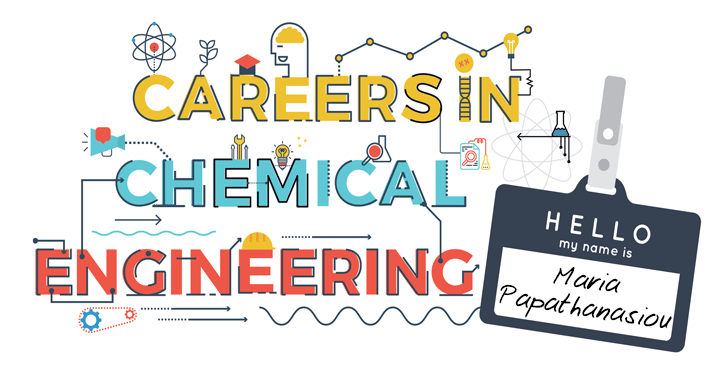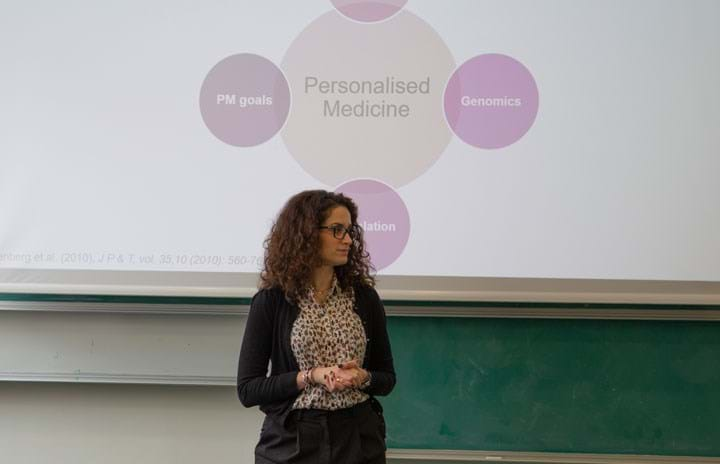Careers in Chemical Engineering: Maria Papathanasiou

Yasmin Ali speaks to Maria Papathanasiou about how she ended up using mathematical modelling to answer questions around juggling the Covid-19 vaccine with the flu vaccine, and how the global supply chain would function if a need for regular boosters arises.
MY NAME is Yasmin Ali and I’m a chemical engineer working in the energy sector. I was originally attracted to study chemical engineering because of the breadth of career opportunities it provides. To showcase this diversity, I will be talking to a range of fellow chemical engineers to find out what they do, how they got there, and why they do it. For this instalment, I spoke to Maria Papathanasiou, a Lecturer at the Department of Chemical Engineering, Imperial College London.
Maria’s research focuses on computer modelling tools for design optimisation and control, with applications in pharmaceuticals and supply chain optimisation. Part of her role, which she started in April 2020, is leading others’ research, and she currently has three PhD, seven Master’s, and six undergraduate students, as well as plans to take on post-docs. She compares the job to being the chief executive of a startup company.
“Your constant job is finding funding, financing your ideas, financing your team, and inspiring other people. It feels like you’re running a company within a big organisation,” Maria told me.
Computer modelling for pharmaceutical applications is a vast field, and Maria approaches it by developing solutions for existing problems, rather than developing solutions and retrospectively fitting them to problems. These come from industry’s “what ifs” and current challenges, or more exploratory questions through interactions with other research groups.
“Ask yourself the question: ‘at the end of the day, who is going to use the model or tool you are building, and why do they need it?’”
A recent example of Maria’s work is on the supply chain for the Covid-19 vaccines.
“My lab is participating in a project with other collaborators from the department and other universities, where we look at the supply-chain elements: and what is the best structure of the distribution network of the vaccines” she explained.
Using mathematical modelling, the group attempted to find the best vaccine strategy. Given a certain capacity of available vaccines, how could the impact be maximised? This involved testing the division of the population into different age groups, health risk groups, giving more people first doses rather than fully vaccinating fewer, and so on.
The group is now looking further ahead, answering questions around juggling the Covid-19 vaccine with the flu vaccine, and how the global supply chain would function if a need for regular booster vaccines arises.
“The way I see models is like puzzles, so you have the problem which is like the image you have on the outside of the box when you buy a puzzle, then you’re trying to find the pieces and put them together,” Maria said.
Artistic mathematics fanatic
Maria is a self-proclaimed fanatic of mathematics. Discovering chemistry and biology ignited her passion for learning about the body, and the environment around us. Aged 15, her artistic side took over, and she decided to be an actress.
“That didn’t go down well with my family. We had an agreement, because I was a good student, that I’d still go to college or some school of my choice, and do the other thing on the side,” she explained.
During her final year of high-school at her home in Athens, Greece, Maria imagined herself pursuing pharmacy and discovering new drugs to cure diseases, making a direct impact on human life.
“My physics teacher put chemical engineering on the table. I thought it was chemistry, and he said no, it has a strong mathematical element. I started looking at what chemical engineers can do, and the list was infinite.”
After a five-year programme at the National Technical University of Athens, Maria completed a thesis on novel starch-based solutions for low glucose content for people with diabetes, then based in Berlin. She then travelled to the UK to complete the Advanced Chemical Engineering Master’s course at Imperial College London.
“At that time, I didn’t want to tag myself as something specific because my degree gave me this flexibility so I didn’t want, at the age of 22, to lose it. It was a good choice.”
Rejections from job applications in banking and finance, and an offer of a PhD from Imperial College London, which she completed in 2017, led Maria to where she is today.
“The more I was researching during my PhD, the more I was getting addicted to research. I couldn’t imagine doing anything else for a living,” Maria said.
She continued to pursue roles in the private sector, believing she was better suited to working for a company. But the more interviews she did, the more she realised this was not the case, as the interaction with students was missing.
“I get really inspired by my students. I learn so many things through teaching.”

Cutting edge biomanufacturing
Maria’s research sits at the junction between several cutting-edge fields, such as bioprocessing, personalised healthcare and digitalisation. She is excited to be one of the first people putting down a brick towards building digitalisation in the pharmaceutical industry.
“My own dream is for processes to manufacture therapeutics that are run in tandem with a digital twin, in other words a mathematical model that is integrated in the process, giving us a look into what is happening in the reactor, in the separation column, completely online,” Maria said.
In practical terms, this could result in higher replicability of drugs in biomanufacturing. Maria gives me the example of monoclonal antibodies, specialised drugs used for autoimmune diseases, cancer, asthma and more recently Covid-19. In simple terms, they flag what needs to be killed, making it easier for the immune system to do its job. The bioprocesses to produce these are tricky, as they are living cells.
“You feed them, they reproduce, you need to keep them happy; ideally they shouldn’t die quickly. There is a series of impurities they produce from their metabolism. This is a huge field of research right now as well, how do we optimise the feeding in the bioreactor to optimise the impurities?”
Enjoying failures
Maria’s response when asked what she enjoyed most in her career so far was surprising: her failures.
“I think this is maybe the most important part of who we are. If I hadn’t failed all those industrial interviews, if everybody had offered me a job, I wouldn’t be here right now, and I wouldn’t have had the opportunity to understand what I really want,” she explained.
It has taken her time to learn how to handle failure, a lesson she openly shares with her students. She is also trying to get better at taking time out for hobbies, like ballet, tennis, and painting, and encourages her students to do the same, reminding them that the weekend is there for a reason. She finds this challenging; being engaged in what you do can easily result in working long hours.
“We need to be mindful, no matter how much you like something, if you do it in extreme amounts, it’s not good. Even chocolate is bad after a certain point!”
Maria’s life motto is “if you can dream it, you can do it.” She believes that if the goal is clear, no matter how many times you fail, if you are patient and receptive to feedback, you will succeed.
“A huge part of what I like in my job is the chance I get to not only teach, but if I can encourage a student or highschool student who may be hesitant to study a subject far away from what their friends do, that’s a big win for me. I feel I have this opportunity to show people that it’s possible.”
For more articles in this series, visit https://bit.ly/2DZmjA4
Recent Editions
Catch up on the latest news, views and jobs from The Chemical Engineer. Below are the four latest issues. View a wider selection of the archive from within the Magazine section of this site.




